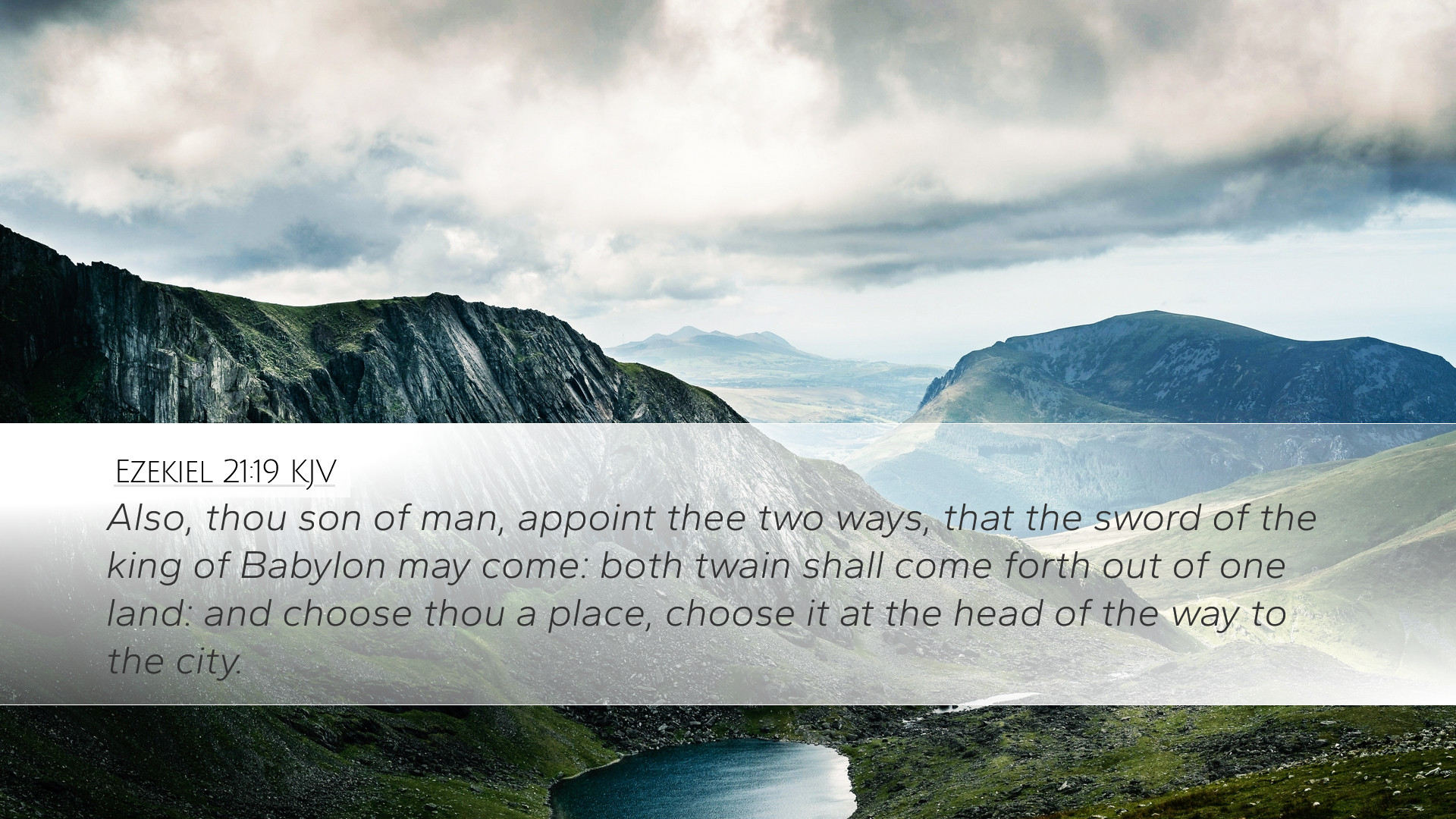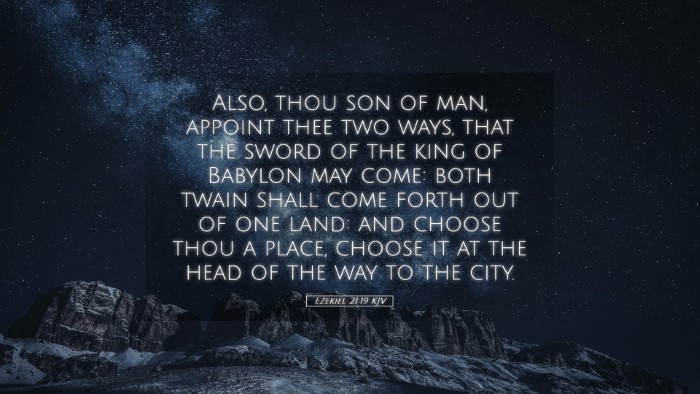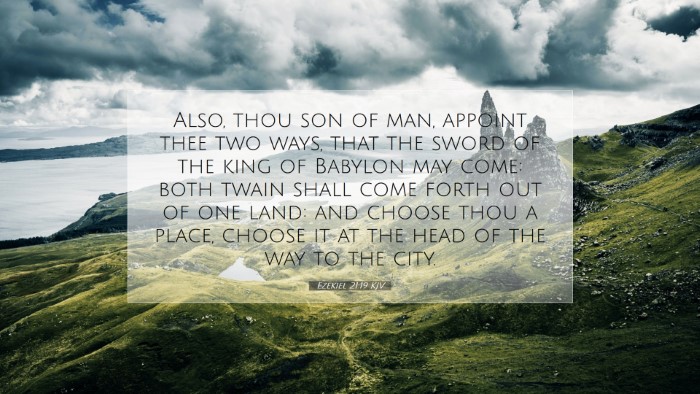Ezekiel 21:19 Commentary
Bible Verse: "Also, thou son of man, appoint thee two ways, that the sword of the king of Babylon may come: both twain shall come forth out of one land: and choose thou a place, choose it at the head of the way to the city."
Introduction
This verse from the Book of Ezekiel is a prophetic declaration laden with symbolism and significance. In an era marked by turmoil and impending judgment, the Lord instructs Ezekiel to visualize two significant pathways. The imagery presented here serves to convey divine guidance amidst chaos. As we explore commentary from respected historical figures like Matthew Henry, Albert Barnes, and Adam Clarke, we will discern deeper meanings and applications of this Scripture.
Contextual Background
Ezekiel, a prophet during the Babylonian exile, conveys messages of warning and hope to the Israelites. This passage falls within a broader prophetic narrative that outlines God's judgment upon Jerusalem, emphasizing the role of Babylon as God's instrument of discipline. The context sets the stage for understanding the severity of the choice laid before the people.
Matthew Henry's Commentary
Matthew Henry emphasizes that this passage illustrates the necessity of preparation and decision-making in spiritual matters. He notes, "The Prophet is directed to represent the two ways as the means by which the Babylonian king would approach Jerusalem." Here, Henry acknowledges the inevitability of judgment but underscores God’s providence in the midst of calamity.
Key Insights from Henry
- Pathways of Decision: The two ways represent the choices that Israel faces, akin to the paths of righteousness versus destruction. Every believer is called to make a conscious choice for faith or rebellion.
- Symbolism of the Sword: The sword signifies the judgment of God. Henry suggests that the sword symbolizes both the authority of Babylon and God's instrument for purging sin.
- Geographic Significance: The instruction to choose a place at the head of the way conveys strategic thinking in divine judgment, indicating that God is not absent in his governance over nations.
Albert Barnes' Commentary
Albert Barnes provides a nuanced interpretation that focuses on the implications of the two ways concerning the choices of both the leaders and the populace. He writes, "The choice of paths indicates the deliberation that must accompany the impending decision," highlighting that God’s counsel must be sought during turbulent times.
Key Insights from Barnes
- The Role of Divine Providence: Barnes emphasizes that God directs the fate of nations in his sovereignty, and often, the paths of judgment are chosen by human actions and choices.
- Call to Discernment: The clear distinction between the ways encourages believers to discern the right path, as both lead to specific outcomes that align with God's justice.
- Judgment is Inevitable: The inevitability of Babylon’s march towards Jerusalem underlines the reality of divine judgment, prompting self-examination among the Israelites.
Adam Clarke's Commentary
In his commentary, Adam Clarke focuses on the prophetic actions of Ezekiel, noting that they serve as visual aids for the people. He explains, "The appointment of two ways reveals the seriousness of the choices at hand and serves as a divine warning." Clarke’s reflections encourage a comprehensive understanding of a prophet's role in clarifying God’s will.
Key Insights from Clarke
- Symbolic Action: Clarke discusses how the act of choosing paths symbolically represents the need for Israel to confront the consequences of their choices, emphasizing accountability.
- Visual Prophecy: The imagery used by Ezekiel is a call to awaken the consciousness of the Israelites, prompting them to understand the implications of their national decisions.
- Connection to Salvation: Clarke draws parallels to the New Testament, suggesting that the two ways can also be seen as reflective of the paths leading to life or death, underscoring God’s desire for repentance.
Theological Implications
The themes found in Ezekiel 21:19 transcend its immediate historical context, inviting deep theological inquiry:
- Consequences of Choices: This prophecy teaches about the grave consequences of choosing paths contrary to God's will.
- The Sovereignty of God: The comprehensiveness of God's plans illustrates His ultimate sovereignty over human history and the unfolding of salvation history.
- Prophetic Urgency: The call to choose paths mirrors God's urgency today, urging His people to make firm decisions regarding faith, obedience, and discipleship.
Application for Today
For pastors, students, theologians, and scholars, the reflections derived from Ezekiel 21:19 serve as a crucial reminder of the enduring nature of God's word and the necessity for discernment in faith:
- Leadership: Leaders should encourage congregations to seek God's guidance, emphasizing the importance of prayerful decision-making.
- Education: Bible studies should incorporate discussions about the implications of our choices and the spiritual ramifications of disobedience.
- Awareness of Judgment: This scripture serves as a sobering reminder that divine judgment is a reality, prompting believers to live righteously.
Conclusion
Ezekiel 21:19 encapsulates a significant moment in the prophetic literature, challenging both the Israelites of antiquity and contemporary believers to consider the paths they choose. As we draw from the insights of Matthew Henry, Albert Barnes, and Adam Clarke, it becomes evident that God’s call to discernment remains as relevant today as it was in Ezekiel’s time. The duality of paths invites all to serious reflection on God’s sovereignty, the weight of our choices, and the transformative power of divine repentance.


